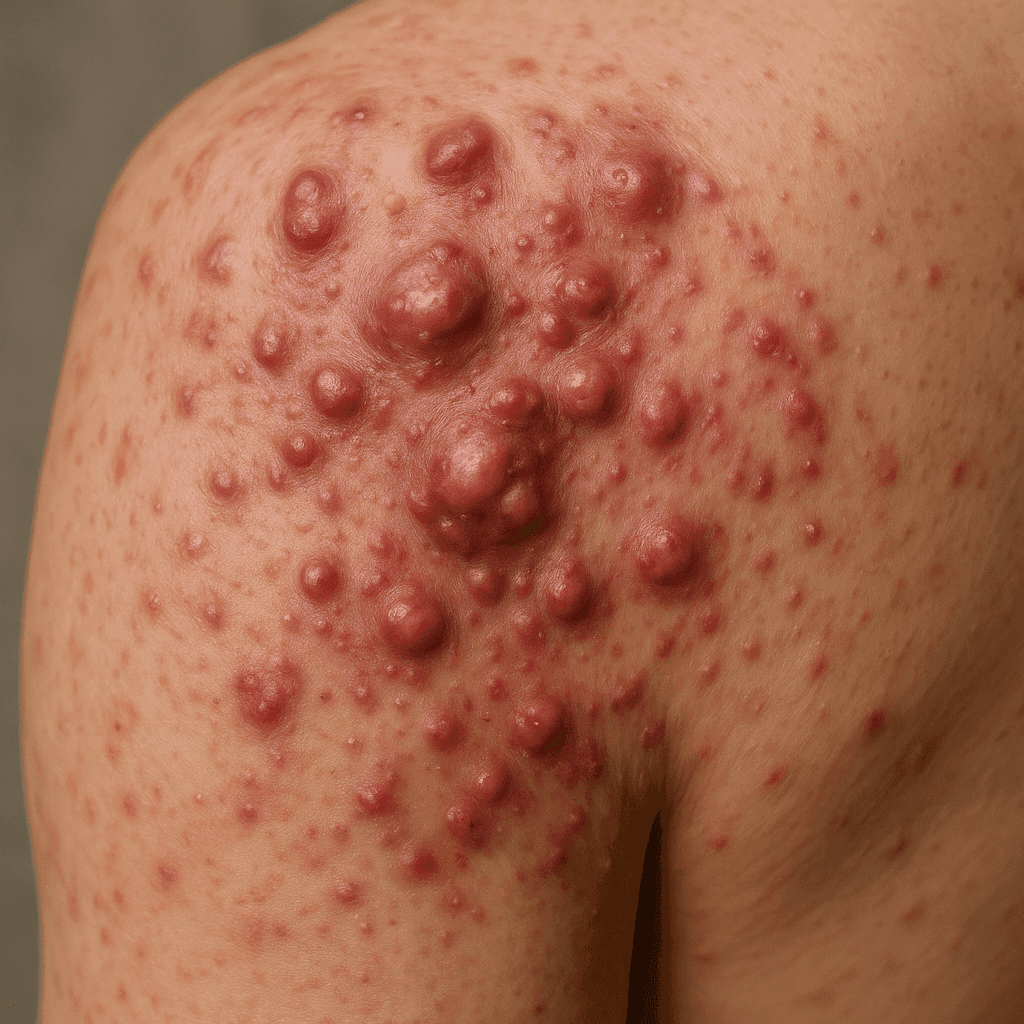Acne Nodulocystic (cystic acne).
A guide to the causes, symptoms, and treatment of cystic acne.
Introduction
Cystic acne, also known as nodulocystic acne, is a severe form of acne characterized by large, painful cysts and nodules on the skin. Unlike milder forms, such as acne vulgaris, cystic acne requires a more complex therapeutic approach. Understanding its peculiarities is key to effective treatment and preventing long-term effects, such as scarring.
Symptoms of cystic acne
Cystic acne manifests itself through large, painful lesions that are often deeply embedded under the skin. Unlike other forms of acne, such as juvenile acne, these lesions can leave permanent scars. It is important to be able to recognize these symptoms at an early stage so that appropriate treatment can be implemented more quickly and potential complications can be reduced.
Causes of cystic acne
Hormonal factors
Hormones, especially androgens, play a key role in the development of cystic acne. Increased sebum production and excessive sebaceous gland activity can lead to clogged pores and cyst formation.
Genetics
Genetic predisposition also plays an important role. People whose parents or grandparents suffered from severe forms of acne are more likely to develop cystic acne.
The influence of diet and lifestyle
Although diet is not a direct cause, it can influence the severity of symptoms. Foods with a high glycemic index or dairy products can worsen skin conditions.
Diagnosis of cystic acne
When to go to a dermatologist
If cystic acne is suspected, a visit to a dermatologist is essential. The specialist will assess the condition of the skin and recommend appropriate tests or treatment. Early diagnosis and treatment help minimize the risk of scarring.
What tests may be required
Often, a dermatologist may order additional tests, such as hormone tests, to better understand individual causes of acne. The results of these tests can help tailor therapy to the individual patient.
Treatment of cystic acne
Pharmacotherapy
Pharmacotherapy is the mainstay of cystic acne treatment. Retinoids are used to help remove keratinized skin, and antibiotics to reduce bacterial infections. Hormonal medications are often recommended to balance androgen levels.
Dermatological treatments
Treatments such as chemical peels and laser therapy can be used to reduce scars and improve the overall appearance of the skin. These treatments often complement pharmacotherapy, increasing the effectiveness of the overall treatment.
Natural treatments
Some patients opt for natural methods, such as the use of essential oils or herbs. While these can provide relief, they should be used as a supplement to, rather than a replacement for, conventional methods.
Preventing cystic acne
Daily skin care and a healthy lifestyle play a key role in preventing the recurrence of cystic acne. Regular facial cleansing, avoidance of stress and a balanced diet can significantly reduce the risk of new lesions.
Cystic acne and scars
Scars from cystic acne are often deep and difficult to remove. Scar reduction methods range from laser treatments to microneedling. It is important to start scar treatment as soon as possible to get the best results.
Cystic acne in adults
Although acne is often associated with adolescence, adults can also suffer from it. Hormonal changes, stress and inadequate skin care can lead to cystic acne in adults. Treatment in this case is sometimes more complicated and requires a personalized approach.
Psychological aspects of cystic acne
Cystic acne can significantly affect patients' self-esteem and quality of life. Psychological support, including participation in support groups, can be invaluable in the treatment process. It is worth remembering that mental health is as important as physical health.
Summary
Cystic acne is a serious skin disease that requires a comprehensive therapeutic approach. Early recognition of symptoms and implementation of treatment that will help minimize the risk of scarring and improve the patient's quality of life is crucial.
FAQ
What are the most common questions about cystic acne?
- **Does diet affect cystic acne?**Yes, a diet with a high glycemic index can exacerbate symptoms.
- **Can cystic acne be completely cured?**Acne can be controlled, but it requires consistent treatment and care.
- **How long does it take to treat cystic acne?**Treatment time is individual, but usually takes several months to a year.

